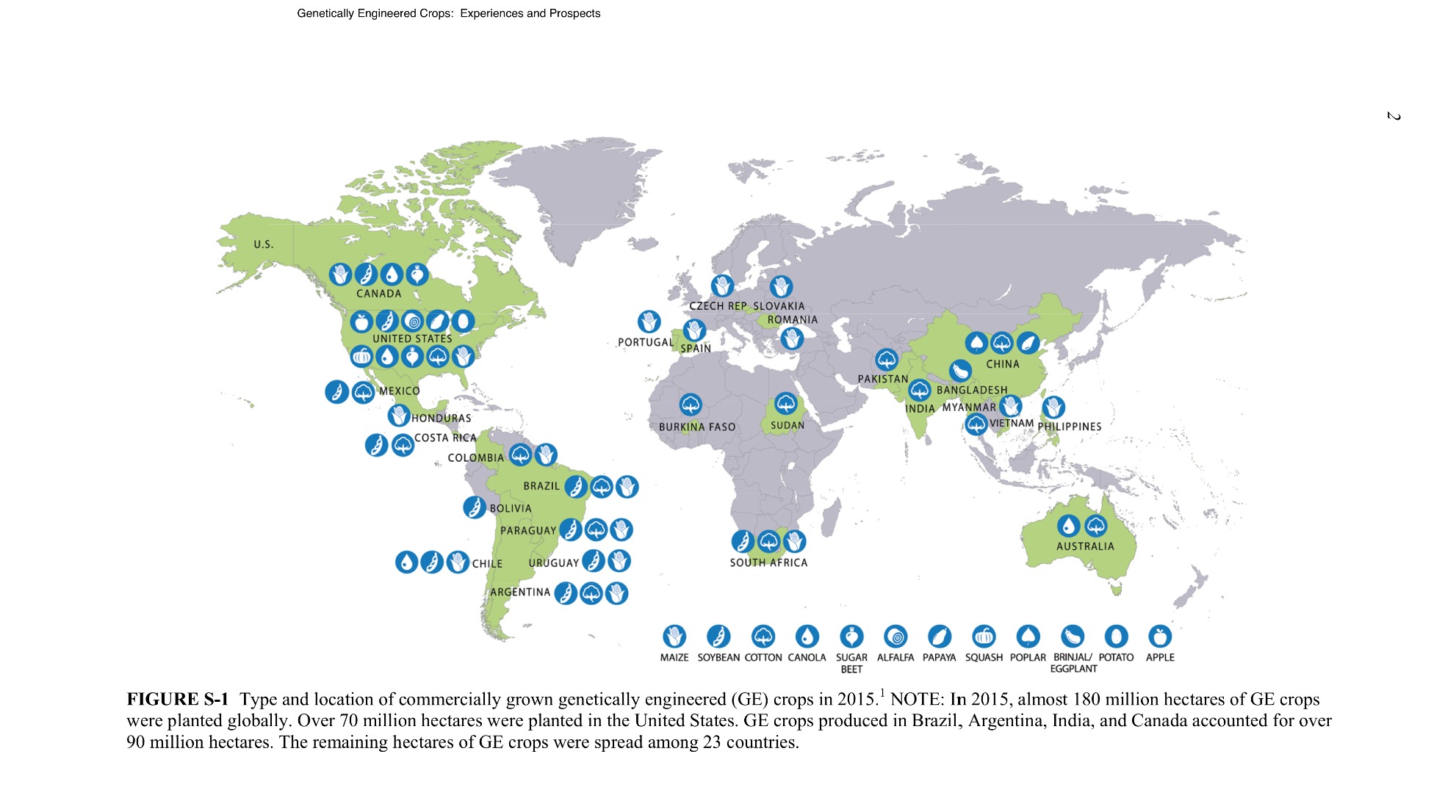A new expert review has confirmed what we suspected all along. GMOs are safe. New report is from the US Academy of Science
Genetically engineered crops are safe for humans and animals to eat and have not caused increases in cancer, obesity, gastrointestinal illnesses, kidney disease, autism or allergies, an exhaustive report from the National Academies of Science released Tuesday found.
Work on the 388-page report began two years ago and was conducted by a committee of more than 50 scientists, researchers and agricultural and industry experts convened by the National Academies of Sciences, Engineering, and Medicine. It reviewed more than 900 studies and data covering the 20 years since genetically modified crops were first introduced.
Yes, GMOs are safe but do they increase yield and save cost ?
The report concludes that they do save cost but may not increase crop yield. It reduces the pest population but may increase the population of herbicide resistant weeds.

Will this report end the irrational fear of GMOs with in the society?
Though it will not end, let us hope more and more people will realise that such a fear is irrational.
See the full report here.

Considering the report is trying to present rational findings, probably not. x)
Sadly, even these blogs have a fair population of such ‘sceptics.’
Well, obviously the paper was faked up by shills for Big GMO
Just what all the anti-GMO people will say. Just what everyone says when the evidence doesn’t support their preferred conclusion. This is how every conspiracy theory begins.
It isn’t the crops that are bad for your health. It is the poisons that they allow to be put on them. And some of the damage is to the soil, and some to the bees. These studies are completely missing the point.
Devocate: I live on a farm where we do about 80ac/year of no-till corn. As far as damage to the soil: no till means there is vastly less runoff because the ground doesn’t get plowed. Corn tends to like acid soil so we lime it and spread poop from the local cow farm and horse farm on it. It’s very nice soil indeed. Not having to plow also saves diesel fuel and equipment wear and tear. The only ‘poison’ used is glyphosate, which only affects plants that have a certain metabolic pathway – we don’t spray anything else that hurts bees and the fields (by agreement with the guy who makes the corn) are a safe home for bears and deer that want a bit to eat. There are surfactants on the glyphosate, which help it stick to the plants, that kill bacteria on the plants, but a) bacteria b) were gonna die anyway c) the corn gets cut eventually so there goes the bacteria’s habitat anyway d) all that stuff is broken down by sunlight and washed off long before anyone – even the deer – eat the corn.
I guess what I’m saying is: you appear to have no idea what you’re talking about. Yet you make bold assertions as if you are speaking about matters of fact. Do you have any facts or knowledge you can use to back up your claims or are you just spouting stuff you read on the internet?
Also: GMO is not just roundup-ready strains, etc. GMO is stuff like golden rice, high yield dwarf wheat strains, freeze-resistant vegetables, etc. Many of those GMOs do not affect insecticide or glyphosate use at all. Norman Borlaug’s GMO high yield wheat was in use before roundup was invented, after all… Additionally, GMOs like antifungal wheat require less spraying.
So, I am suspicious of the presentation of the article. It’s a sign of motivated reasoning to treat all GMOs as if they were the same thing just because they have had their genes tinkered with. The question is what are the effects of that tinkering on any resulting produce from the organism, and does that tinkering increase/decrease yields or make changes to agricultural practices and what are their trade-offs.
One could imagine a GMO version of broccoli that – hypothetically – produced the insecticide Sevin(tm) in it. This would be “insect resistant broccoli” and would be very different indeed from a “roundup ready” version that resisted glyphosate. Because in one case you’d be eating insecticide and in the other, you wouldn’t. Oh – by the way – broccoli naturally produce Sevin(tm) as a result of being selectively bred to produce strains that appear to be more insect-resistant. That has been going on since the 1920s or so. is a vegetable only GMO if it’s been modified recently?
I recommend reading Bruce Ames’ “Dietary pesticides (99.99% all natural)*” (Yes: that Bruce Ames) http://www.pnas.org/content/87/19/7777.full.pdf Here’s the money shot:
Thank you for the feedback Marcus. I agree to your point that all GMOs should not be considered as of having same effects.